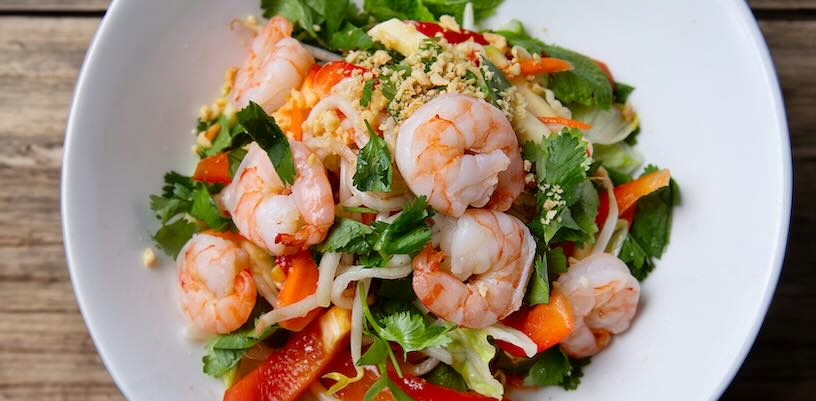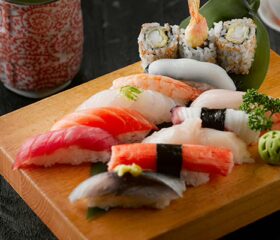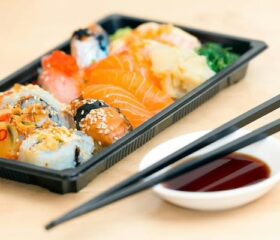Can Pregnant Women Eat Shrimp?
The safety of seafood consumption—including shrimp—often sparks concern among moms-to-be.

Pregnancy brings about different food cravings, often at peculiar times. You may suddenly want a shrimp cocktail or another shrimp dish in the middle of the night, but can you have one?
Fortunately, the answer is yes. Read on to learn about the benefits of eating shrimp, how to prepare it for safe consumption during pregnancy, and which seafood you should include (and exclude) in your meals.
Is it safe to eat shrimp while pregnant?
Yes, it’s safe to eat shrimp in moderation while you’re pregnant, as long as you cook them thoroughly. In fact, shrimp is one of the best types of seafood to include in your pregnancy diet. 1
Shrimp is relatively low in mercury, which is good for pregnant women. (Seafood that’s high in mercury can harm your developing baby’s brain and nervous system.) 2
Shrimp also provides nutrients that will benefit your baby’s development, especially her: 1
- Brain: This is bolstered by omega-3 and omega-6 fats, iron, iodine, choline, and vitamin B12 3
- Immune system: Iron, zinc, selenium, and vitamin D 4 5
With all of that said, as nutritious as shrimp is, you shouldn’t overconsume it.
How much shrimp can you eat while pregnant?
You can eat about 2–3 servings (8–12 ounces) of cooked shrimp and other low-mercury fish and shellfish per week while pregnant. 6 If you eat more than that, it’s possible that even the small amounts of mercury in them will accumulate in your body and eventually lead to problems for you or your baby.
Keep track of how many servings you’ve had each week in your journal or pregnancy tracker app so that you don’t accidently exceed the limit.
Note that it’s best to include a variety of seafood in your weekly diet instead of only eating shrimp (no matter how delicious you find it or how much you’re craving it).
What other low-mercury fish and shellfish can you eat while pregnant?
The Food and Drug Administration (FDA) and Environmental Protection Agency (EPA) have listed 30+ low-mercury fish and shellfish that pregnant and breastfeeding women can eat up to three servings of per week.
In addition to shrimp, the list of pregnancy-safe seafood also includes:
- Anchovy
- American and spiny lobster
- Clam
- Catfish
- Cod
- Canned light tuna
- Flounder
- Freshwater trout
- Herring
- Oysters
- Pacific chub mackerel
- Salmon
- Sardines
- Scallop
- Whitefish
Prawns, which are very similar to shrimp (differing in size and some anatomical details), are missing from that list. However, they’re also low in mercury and safe to eat during pregnancy. 7 8
Safety precautions for eating shrimp while pregnant
The number one rule for eating shrimp (and other seafood) while pregnant is to cook your food thoroughly. This means that pregnant women can’t eat ceviche, seafood salad, or other, similar dishes.
Raw seafood may sometimes harbor parasites or bacteria, including Listeria, which can cause many severe pregnancy complications, including: 9
- Miscarriage
- Stillbirth
- Premature delivery
- Life-threatening infection in newborns
For safe consumption, cook your shrimp to 145°F (63°C) or until its skin turns opaque or milky white. Don’t eat shrimp that sat out at room temperature for over two hours, or above 90°F (32°C) for over an hour. 10
Even if you think your seafood is cooked correctly, watch out for the symptoms of listeria during your pregnancy, such as fever, muscle aches, fatigue, headaches, nausea with vomiting, or diarrhea.
Be mindful of where you source your shrimp
To ensure the quality of your shrimp, you should learn how to select it, and only buy from places with a good reputation for fresh, properly handled products.
Fresh (uncooked) shrimp should have a pearl-like color and little to no smell. Check if the product has a label or tag detailing its information, including the processor’s certification number. This indicates that the processor follows federal safety regulations for harvesting and processing shrimp. 10
If you catch your own shrimp, be sure to stay updated on local fish advisories in all 50 states. They provide current information about potential contamination in regional waters.
What seafood should you avoid during pregnancy?
While shrimp isn’t on the list of foods to avoid during pregnancy, a lot of other seafood is. Specifically, you should stay away from high-mercury seafood, which, as mentioned, can harm your baby’s brain and nervous system development. 2
The FDA and EPA suggest you avoid the following seafood with very high levels of mercury: 1
- King mackerel
- Marlin
- Orange roughy
- Shark
- Swordfish
- Tilefish (from the Gulf of Mexico)
Watch out for fish with different mercury levels across species. For instance, pregnant women can eat tuna, but some varieties like bigeye tuna are high-mercury and should be avoided.
As a rough guideline, fish that are larger and higher on the food chain tend to accumulate more mercury in their bodies before they’re caught, which makes them unsafe to eat while you’re pregnant (and best consumed in moderation even at other times).
Final thoughts
Fresh, cooked shrimp is safe and healthy to eat during your pregnancy. You can also include other low-mercury seafood in your diet to mix things up. If you’re ever unsure about eating a particular kind of seafood (or anything else, for that matter), the best course of action is just to ask your doctor.
Article Sources
- U.S. Environmental Protection Agency. "EPA-FDA Advice about Eating Fish and Shellfish" Retrieved September 8, 2025.
- Office of Environmental Health Hazard Assessment. "Frequently Asked Questions about Eating Fish for Women 18-49 years and Children 1-17 years" Retrieved September 8, 2025.
- Centers for Disease Control and Prevention. "Vitamin B12 and Breastfeeding" Retrieved September 8, 2025.
- The Nutrition Source. "Selenium" Retrieved September 8, 2025.
- MedlinePlus. "Vitamin D" Retrieved September 8, 2025.
- U.S. Food and Drug Administration. "Questions & Answers from the FDA/EPA Advice about Eating Fish for Those Who Might Become or Are Pregnant or Breastfeeding and Children Ages 1 to 11 Years" Retrieved September 8, 2025.
- National Health Service. "Foods to avoid in pregnancy" Retrieved September 8, 2025.
- Better Health Channel. "Mercury in fish" Retrieved September 8, 2025.
- U.S. Food and Drug Administration. "Listeria (Listeriosis)" Retrieved September 8, 2025.
- FoodSafety.gov. "Safe Selection and Handling of Fish and Shellfish" Retrieved September 8, 2025.







